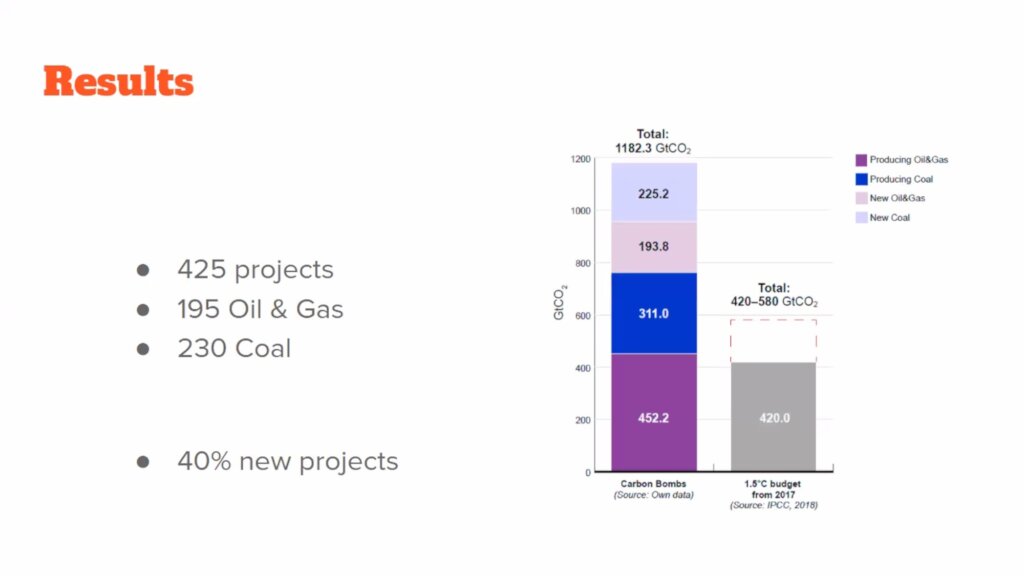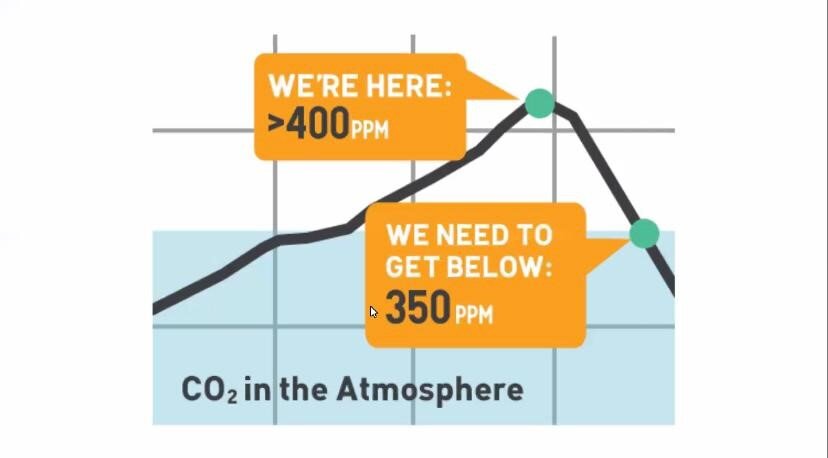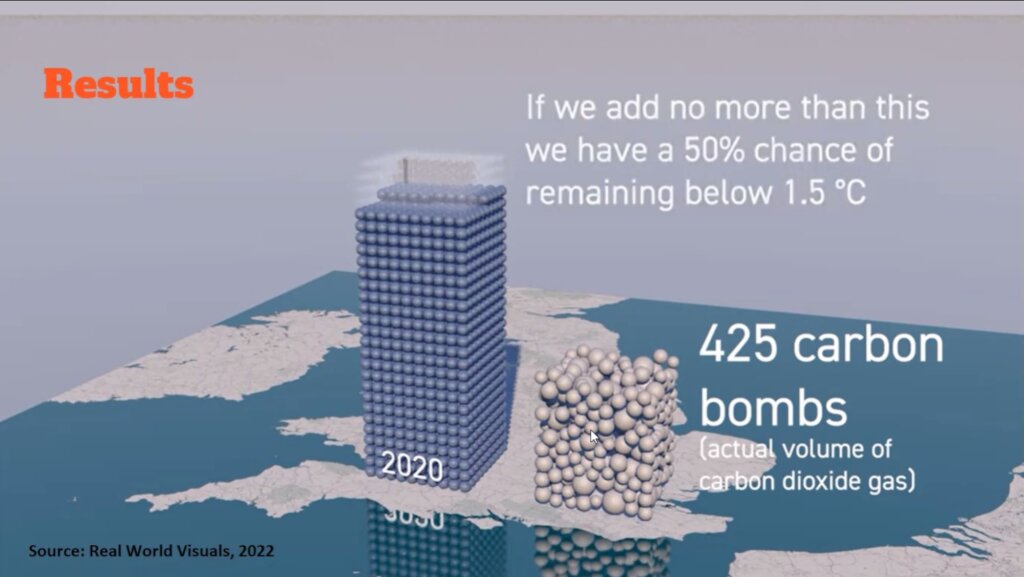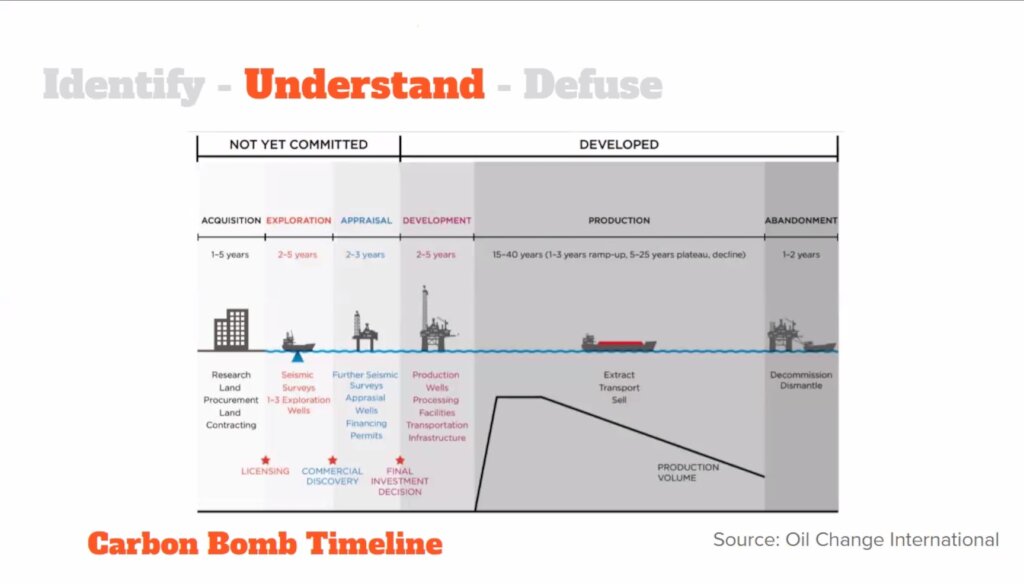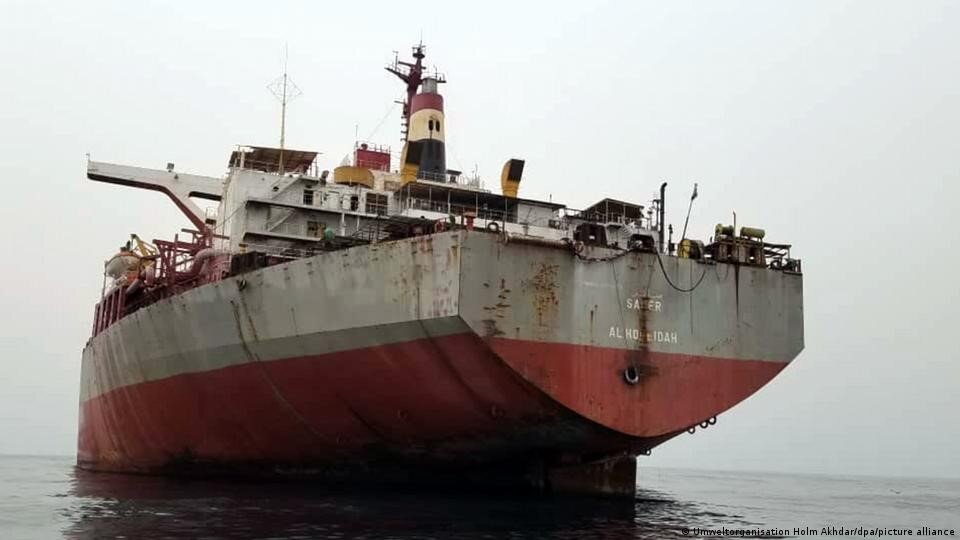By Aleksander Esmann | HAF Intern
The webinar “Defusing Carbon Bombs in the MENA Region” took place on June 6, 2023. It was part of the webinar series “Towards Defusing Global Carbon Bombs”, which was organized in collaboration between the Climate Action Network International (CAN-I), the Leave It In The Ground Initiative (LINGO) and regional partners.
This session covered the importance of identifying and defusing carbon bombs in the MENA region to reverse climate change, protect the environment and to improve the living situation of the local population.
The climate emergency needs a new response from global society: defusing carbon bombs, the biggest fossil fuel projects in the world, which emit more than 1 Gigaton (1 billion tons) of CO2 over their lifetime. LINGO, Global Energy Monitor and Urgewald have published a global list of over 400 projects (half coal, half oil & gas) and their analysis shows that the CO2 emissions of these projects would take us way beyond the 1.5°C goal. We need to pay more attention to them and develop strategies to prevent the implementation and the disastrous consequences of these projects.
On an important sidenote: The High Atlas Foundation is grateful to have partnered with LINGO, Germanwatch, GreenFaith, Ummah for Earth, the The Faculty of Islamic Law at University Sidi Mohammed Ben Abdellah on the International Conference on Islam and Climate Emergency in Fes that took place this past February. Our shared public statement reflects the common understanding reached by the Islamic and climate scholars over the course of the three days.
Kjell, the director of LINGO, started the session by presenting the current situation regarding carbon bombs in the whole world. Currently, there are 425 projects considered carbon bombs all over the world. However, 40% of these are new projects which means that they are only in the planning or construction phase. This gives initiatives such as LINGO more possibilities to fight these projects to prevent their implementation and protect the climate and environment.
Right now, there are on average 421 parts of CO2 per 1 million particles (ppm) in the atmosphere. In order to reach the 1.5° C target the concentration needs to be below 350 ppm.
If no new carbon bomb projects were to be added to the current ones, we would have a 50% chance of actually reaching the 1.5°C target set by the Intergovernmental Panel on Climate Change. Otherwise, staying below 1.5°C of global warming is virtually impossible. Kühne´s research on this topic was also featured in a Guardian article about carbon bombs.
To defuse these carbon bombs LINGO has developed a three-step approach: Identify, Understand and Defuse.
The International Energy Agency has stated that there is no need for the construction of new fossil fuel projects. Instead, current projects should be put into harvest mode where they are kept running until the end without additional expansion to bridge the transition phase to a carbon neutral society in the future. Alternatively, projects such as coal mines with a particularly bad impact on the environment should be shut down early to mitigate potential damages.
Big projects take lots of time and there are many players involved, which offers many potential points of intervention to stop them. To achieve that, a global, climate-friendly, bottom-up approach is needed.
Considering that the emission of 1 Gigaton of CO2 amounts to approximately 225,000 deaths and $418 billion in damages, millions of lives and trillions of dollars could be saved this way. One of the possible intervention points is researching the supply chains, identifying important project partners in areas such as insurance, finance, logistics, sales, refining, etc. and publishing information about their involvement to force these companies to submit to public pressure and pull out of these projects.
Another way to stop these projects is using litigation to force courts and governments to investigate the projects and punish companies for breaking laws as well as creating publicity for these issues. It is also important to reverse the reframing of harmful energy sources by the fossil fuel industry to green and sustainable alternatives.
For example the renaming of fossil gas to natural gas has led the population to believe that it is environment-friendly. In reality however, it is methane, a greenhouse gas with a big short-term impact. Decreasing the use of methane would have an immediate, positive impact on health and the environment across the world.
Next, Kate from Crude Accountability talked about the carbon bomb situation in Azerbaijan. The Azeri Chirag Guneshli oil field with its 141 wells in the Caspian Sea has had a massive impact on the local environment and communities. Especially the flaring of methane, which is extracted from the ground as a byproduct of oil drilling, is very harmful. Crude Accountability talked with community members of the region and they found that many kids had epilepsy and that the emissions caused various brain disorders. Toxic rain in the region together with destroyed and contaminated soils also makes growing crops almost impossible. On top of that many fish have died, meaning that local fishermen have lost their livelihood because of oil drilling.
However, after being presented with these facts, BP, the operator of the site, said that they have conducted independent studies and that it is the waste of the local population and not BP´s emissions that are the cause for these problems.
Currently, BP and the Azerbaijani government are even planning to expand the field. Only a small amount of the extracted oil and gas actually stays in Azerbaijan. Most of it is exported to western countries, meaning that most of the pollution in the region could be prevented if western countries stopped importing oil and gas from there. In addition to pushing for an import stop, BP and international financial institutions that are supporting this project must be held accountable and put under pressure by the public and by legislators to stop these practices.
Julien, program director at Greenpeace MENA, talked about the FSO Safer, an almost 50-year old floating oil storage and offloading vessel, which is moored about nine kilometers off Yemen’s Ras Issa peninsula, where it has been since 1988. FSO Safer has not been maintained since 2015 because of the conflict in Yemen, and it has decayed to the point where there is an imminent risk it could explode or break apart, which would have disastrous effects on the region. The ship is estimated to contain about 1.14 million barrels of oil valued at up to $80 million.
A potential oil spill from FSO Safer would devastate local fishing communities, risking 200,000 livelihoods as toxic pollutants would be released into the water and the air. The spill would also close nearby ports, which are crucial for food and supplies to 17 million people. It could reach the African coast, harming coral reefs and marine life. Experts estimate that the recovery of fish stocks would take 25 years and have devastating impacts on the economy and food security in the region. Cleanup costs of $20 billion and disruptions to global trade through the Bab al-Mandab strait would further add to the impact.
Greenpeace and the UN have been campaigning for a rescue mission since 2020, but only now have they raised the necessary funds to begin with the first phase, which costs $100 million. Interestingly, international oil companies such as Total and ExxonMobil were using the tanker to store oil and actually own part of the oil stored on the vessel, but they were not ready to contribute money to the rescue mission.
This kind of negligent and reckless behavior must be exposed and the irresponsible and the damaging business models of the fossil fuel industry restricted.
Ahmed from CAN-I in Egypt is a marine biologist who works on the conservation of the Red Sea as well as the phasing out of fossil fuels as part of the energy transition. In this webinar he talked about the role and actions of fossil fuel companies in the global south.
Unlike many countries from the global north, many developing countries have not yet established working energy infrastructure and universal energy access for their population. While this creates additional challenges and need for bigger investments in addition to the energy transition, this also creates opportunities for these countries to skip fossil fuels and focus on green energies straightaway. While this is more costly and might take longer, the population of these countries would gain a lot of long-term rewards from this strategy.
However, many oil companies approach these governments and offer to pay for the infrastructure to give the people energy access in exchange for getting the right to drill for oil and gas. As an alternative, countries should promote an equitable phase out of oil and gas. However, this sounds easier than it is as many countries, especially in the global south, heavily rely on fossil fuel exports for their budget. These countries require international, financial and technical support for this transition, but they also must be ready to rethink and change their economy to meet the new demands of the future. The goal of this energy transition has to be to create a safe environment for people to live in all across the world.
Ermioni from the Gastivists in Greece presented the current situation in the Eastern Mediterranean and what actions NGOs and activists are taking to improve it. The region is one of the areas with the largest biodiversity in the world. Recently, governments have been pushing fossil fuel extraction and the construction of pipelines. The region is already suffering from extreme climate events such as droughts and floods, which lead to crop losses and food shortages. Fossil fuels and possible pipeline leaks in the sea would not only exacerbate these issues, but also heavily impact tourism and the fishing industry, which are important pillars of the economy for many of these countries.
Oil and gas projects are often sold to the population as something patriotic that would increase the power and influence of the country in the region, when in actuality it is harming the people and the environment. While there are grassroots movements, they are still very new and only developing slowly as they are trying to build trust with affected communities. The climate change movement in the region is small and very euro-centric, which makes it important to put a bigger emphasis on region-specific challenges and issues in the work of the NGOs. One of the main projects of Gastivists is the prevention of the expansion of gas by working against the construction of new LNG terminals in Greece.
Jessica from the BBC, who is the director of the award-winning documentary “Under Poisoned Skies” talked about her movie, which is about the gas flaring in Southern Iraq and the harmful impacts it has on the people living there. Nowhere else in the world is gas flaring happening this close to the homes of people (as close as 250 meters). During the day big, black clouds of smoke cover the sky, while at night the sky is lit by burning gas. When Jessica came there, the flaring was happening 24 hours a day and the people said cancer was as common as the flu. Together with a team of doctors and scientists she put into place pollution monitoring and as expected the concentration of carcinogens in the air, water, soil and the bodies of the people was way above the risk-free level.
The oil companies, however, do not care as there are no regulations in these countries and they get paid more money if they do not implement safety measures. If they captured the methane instead of burning it, they could prevent a lot of CO2 emissions (gas flaring produces globally more CO2 emissions than the UK) and protect the local population and environment, but they would lose some money because they would have to decrease their oil extraction rate. Even though oil companies made their highest ever profits from Iraqi oil fields last year, companies are not ready to take this small cut in their earnings. These oil companies such as BP, who is the lead operator of the site, also do not report their emissions from flaring by using a loophole, which allows them to not disclose emissions from sites where they are not the sole operator.
The movie has however had an impact. The Iraqi government has moved its target for zero gas flaring forward to 2025 and the UK pension investment fund, which is a big shareholder of BP, voted against reinstating BP´s chairman after the documentary exposed BP´s bad practices.
The main character of the movie, Ali, was supposed to speak at BP´s shareholders meeting on April 27, but sadly he died of leukemia six days before the meeting. He was only in his twenties when he passed away. His tragic death is just one example of how the harmful methods of the fossil fuel industry destroy human lives and that it is imperative to act now to stop them.
Ali´s family is still living in the same place and children continue to be exposed to the dangerous flaring emissions and the systemic human rights infringements. It is time to hold oil companies accountable and change this. Especially people from regions such as the Middle East and Northern Africa, which are already heavily affected by climate change and the bad practices of oil companies, need to raise their voice because if the current trend continues, these regions might become uninhabitable in the years to come.
Project reports on GlobalGiving are posted directly to globalgiving.org by Project Leaders as they are completed, generally every 3-4 months. To protect the integrity of these documents, GlobalGiving does not alter them; therefore you may find some language or formatting issues.
If you donate to this project or have donated to this project, you can recieve an email when this project posts a report. You can also subscribe for reports without donating.
Support this important cause by creating a personalized fundraising page.
Start a Fundraiser